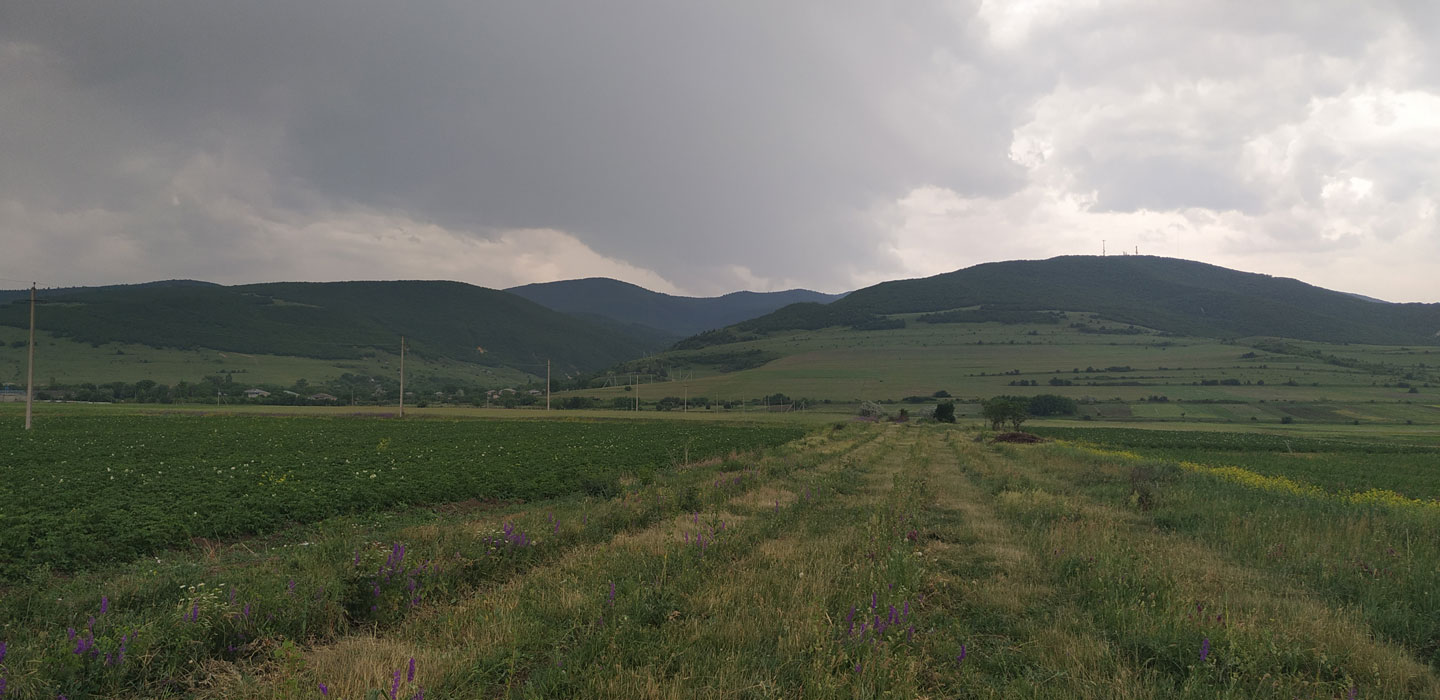Climate-smart agriculture supports food systems in rural Georgia
IFAD Asset Request Portlet
Asset Publisher
Climate-smart agriculture supports food systems in rural Georgia
Estimated reading time: 4 minutes
If it weren’t for 39-year-old Irina Mshvenieradze’s careful tending, her lands might have looked no different than much of the surrounding countryside: soil stripped bare by winds and desertification. The frequent wind storms brought other troubles, too, such as extreme temperature swings that further weakened the soil and made her apple trees and blackberry vines vulnerable to diseases and pests. Despite her best efforts, Irina found her yields decreasing from year to year.
Irina wasn’t alone in her experience. In recent years, farmers across rural Georgia have had to contend with severe production losses and significant threats to their food security. The changing climate has led to a constant barrage of extreme weather events – floods, droughts, wind storms – that have degraded the land and left farmers struggling to cope. An especially hard-hitting spell of heavy rains, hail and winds in July 2012, for example, left many areas of the country in a profound state of emergency that they never fully recovered from.
With no end to these weather patterns in sight, the focus turned to helping Georgian farmers mitigate and adapt. The situation was especially urgent for the country’s small-scale farmers, many of whom lack access to the financial resources and technologies – including the latest agricultural techniques – needed to make these changes.
A holistic approach to restoring the food system
The AMMAR project, launched in 2015, was designed to address these challenges. The project forms part of the Georgian Ministry of Agriculture’s ongoing programme to modernize the country’s agriculture sector, with the support of IFAD, the Global Environment Facility (GEF), and the Danish International Development Agency (DANIDA).
Because the entire food system had been so heavily affected, AMMAR project staff knew they needed to adopt a holistic approach that would address all components of the system simultaneously. They therefore decided to promote climate-smart agriculture (CSA) practices, a set of approaches that help farmers transform their agricultural systems in response to changing climate circumstances while sustainably increasing their yields and incomes.
Since then, AMMAR has helped many Georgian farmers restore their local ecosystems and find new ways to produce and sell goods that sustain both the environment and their businesses. For example, they have encouraged the regular pruning of fruit trees, a practice that helps prevent damage from heat and moisture; helped farmers set up and maintain natural windbreaks; introduced beekeeping (an excellent way to support agricultural productivity and biodiversity while increasing and diversifying rural incomes); and trained farmers in composting and vermiculture (the raising of earthworms) to improve soil quality. They have also introduced new practices, such as the use of greenhouses, to protect crops from hazardous weather.
AMMAR has also provided plenty of equipment, from anti-hail nets and organic fertilizer to drip irrigation systems and seedling nurseries, to help farmers make the most of the new CSA practices. They also offer regular training sessions, maintain demonstration plots to provide examples of best practices, and organize exchange visits between groups of farmers. The latter, in particular, give participants a chance to teach and learn from each other and provide a way for them to explore new opportunities in their local and regional economies.
Spotlight on windbreaks: One solution for many challenges
Although the land degradation rural Georgians have experienced has multiple causes, one single factor – wind erosion – has proven to be the primary driver. Establishing windbreaks has therefore been central to AMMAR’s activities. In collaboration with the Regional Environmental Center for the Caucasus, AMMAR has set up pilot windbreaks on over 2,800 hectares of land to date. The resulting reduction in wind speed has many benefits, including better control of soil erosion, more favourable snow distribution, improved food and wood production, an increase in livestock productivity, and improved crop quality and yield. In total, the windbreaks correspond to a reduction of 234 tons of CO2-equivalent greenhouse gas emissions. They also provide a habitat for up to 1,000 animal species.
When Irina heard that AMMAR was setting up windbreaks, she applied right away. In November 2019, she received 920 seedlings of tall trees, such as poplar, cypress and maple, along with the materials needed to protect growing saplings and manage water flow. After attending training sessions on how to construct and maintain the windbreak, she was ready to begin.
By the following summer, her work was already paying off. In addition to buffering her eight hectares from the wind, the windbreak helps accumulate moisture in the soil and shades her apples and blackberries from the sun, increasing the quantity and quality of her yields – and therefore her income. The increase in biodiversity in the area around the windbreak also provides some natural pest control, helping Irina avoid the use of pesticides.
“I am delighted with the project support,” she says.
Over all, the promotion of CSA practices and the introduction of innovative technologies has made a significant contribution to building the climate resilience of Georgian agriculture. The success of the windbreak pilot, in particular, has raised hopes of extending the practice to other areas. To this end, AMMAR has contributed to a policy framework that would help establish windbreaks across the country. Of course, transforming food systems is an extremely complex undertaking, involving cross-cutting biophysical, socio-economic, political and institutional elements across all elements of the system. For all these reasons and more, it is vital to scale up CSA practices to promote their sustainability across the entire system. But with farmers’ continued interest and enthusiasm, this momentum is only expected to increase.
Learn more about IFAD’s work in Georgia.
Publication date: 07 June 2021